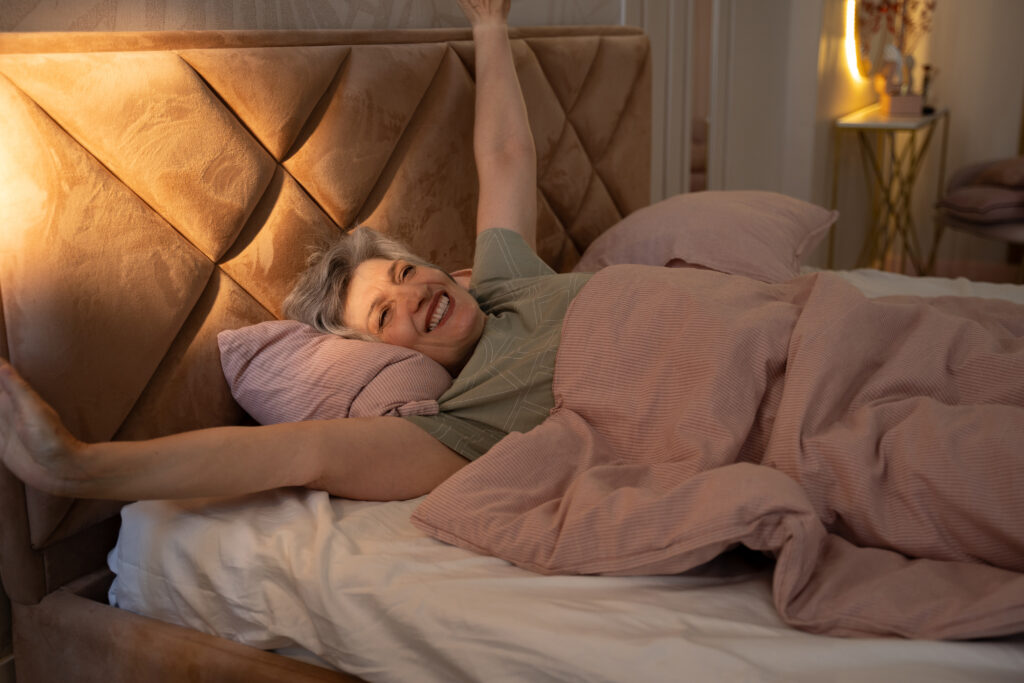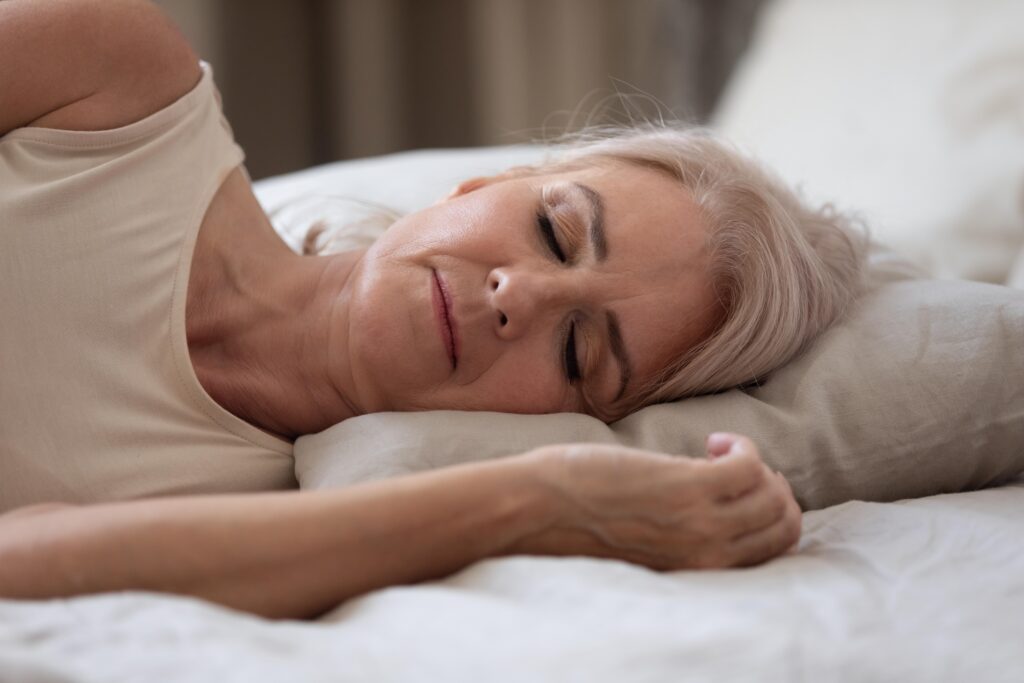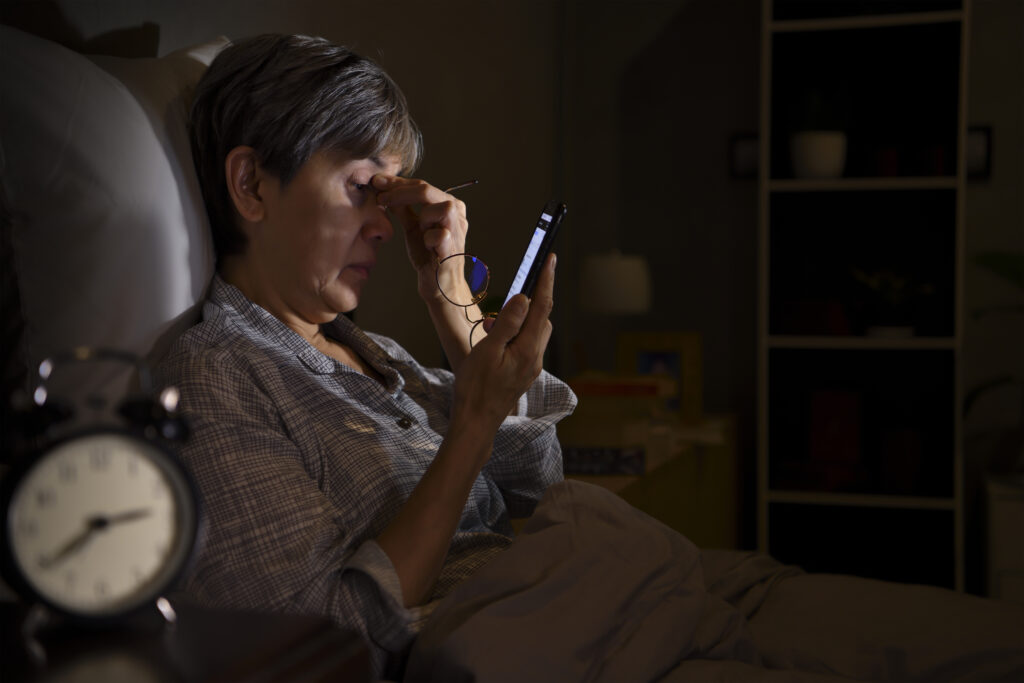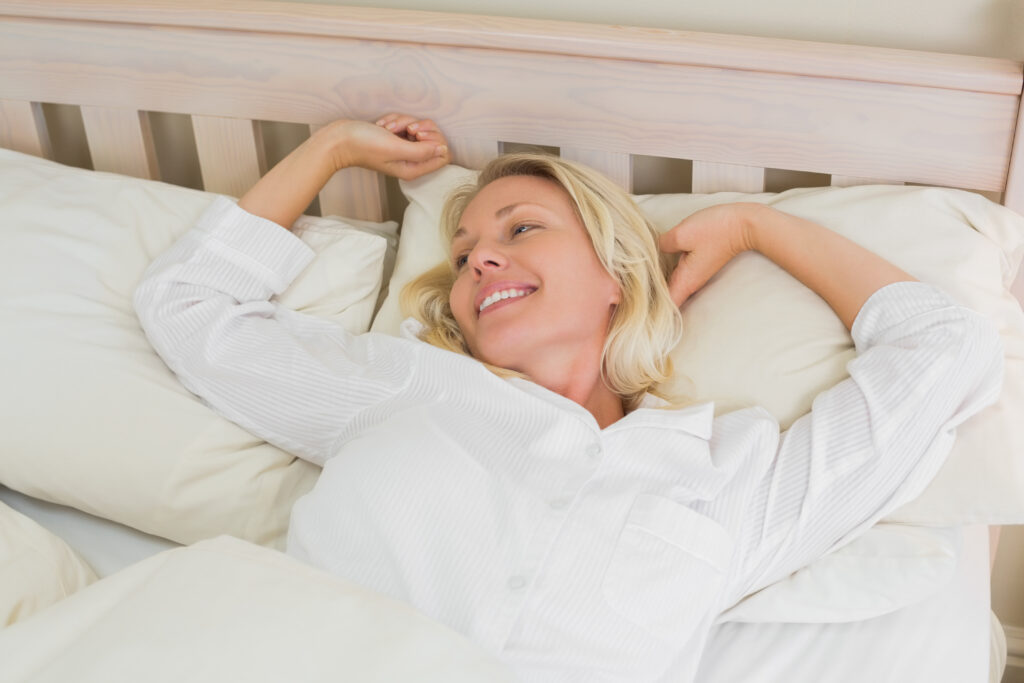Did you know that 61% of women undergoing menopause battle with insomnia? Nights of tossing and turning become more common as the menopause phase unwinds, but why does sleep play hard to get during these years? With hot flashes affecting 40% of perimenopausal women and the risk of developing sleep apnea increasing twofold to threefold after menopause, it’s clear the quest for better sleep is not just desirable, it’s essential. Learning how to improve sleep during menopause is not only about finding relief; it’s about harnessing wellness in a time of significant change.
Addressing menopause symptoms that interfere with rest, such as night sweats and mood imbalances, could be the key to unlocking menopause wellness. Indeed, while short-term solutions like melatonin can provide respite, they are not the cure-all for sleep disturbances. Notably, progesterone—the hormone strongly linked to slumber—dips during menopause, amplifying the urgency to discover enduring menopause sleep tips that promote tranquility through the night.
From the soothing powers of natural remedies and the serenity of a sleep-conducive environment to the transformative effects of lifestyle adjustments and regular exercise, the journey towards revitalizing sleep is multifaceted. And while the allure of hormone replacement therapy (HRT) promises a potential oasis in the desert of wakefulness, few objective differences in sleep have been recorded with its use. So if your nights are restless and the sandman seems to have forgotten your address, stay tuned as we delve into practical and effective strategies for reclaiming your rightful kingdom of sleep during menopause.
Understanding the Impact of Menopause on Sleep
Menopause brings big changes in women’s health, often making sleep harder to get. Up to 86% of women find it hard to sleep well during this time. This affects how they feel during the day and is key to health aging.
Menopause can cause many sleep problems. Hot flashes and night sweats are well-known sleep disruptors. But emotional stress from caring for others or work also plays a big part. This mix of factors can make sleep quality drop, hurting women’s overall health.
Studies show that sleep issues vary among women at different stages of menopause. Hormonal changes are a big factor. Research in places like the U.S. and Brazil shows that menopause affects sleep worldwide, making it a global health aging issue.
To fix sleep problems, we need to look at the whole picture. Making lifestyle changes, like setting a regular sleep schedule and making the bedroom comfy, helps. Studies like the SWAN show us how to target specific sleep issues with the right treatments.

In conclusion, menopause can really disrupt sleep, but we can fight back with the right strategies. It’s important to focus on sleep solutions that meet the needs of menopause. This can help women age healthier.
Natural Remedies for Restful Sleep During Menopause
Many women find their sleep changing during menopause. Using menopause sleep tips and natural remedies can help. These can make sleep better during this time.
Dealing with night sweats and mood changes is common. It’s key to create habits that help with sleep. Keeping a regular sleep schedule and doing relaxing activities before bed can help.
Staying away from screens before bed and making your bedroom quiet and comfy is good too. Yoga or stretching before bed can also help.
Cognitive behavioral therapy for insomnia (CBT-I) is a great way to improve sleep. It helps women with menopause symptoms without using medication. It focuses on reducing stress and anxiety at night.
Avoiding caffeine, big meals, and alcohol before bed can also improve sleep. Supplements like magnesium or L-theanine can help by making falling asleep easier and improving sleep quality.
Developing healthy sleep habits is not just about adding more hours of sleep but enhancing the quality of sleep each night.
Some women turn to over-the-counter sleep aids like melatonin. But these can be unreliable because of dosage and effect issues. Instead, natural supplements like magnolia bark and its components could be a better choice for better sleep during menopause.

Creating a Sleep-Enhancing Environment
Menopause wellness is key to healthy aging. Sleep quality often changes during menopause. To improve sleep, focus on a relaxing and comfortable sleep space.
For a sleep-supportive environment, keep the room at a comfortable temperature. This is hard for many women as hot flashes can disrupt sleep. Use blackout curtains or shades to block out light and noise. Also, having a good mattress and bedding helps.
Don’t use electronics before bed as they can mess with your sleep. Instead, try reading or meditating to relax. For more tips on sleep solutions, check out resources for those over 50.
Sticking to a regular sleep schedule helps your body’s clock. This can make sleep better during menopause. These tips help with sleep and overall health during menopause.
Menopause affects many women, causing insomnia and night sweats. These strategies are crucial for health. Chronic insomnia can really lower life quality, making good sleep solutions very important.
Creating a good sleep space helps manage menopause sleep issues. This leads to better daily life and health. It’s not just about sleeping more, but also getting quality sleep.
Lifestyle Adjustments to Improve Sleep During Menopause

Understanding how lifestyle changes can help with senior women’s health during menopause is key. During this time, getting better sleep is crucial for overall health. Many women face sleep issues during perimenopause, affecting 16% to 47%. These numbers show the importance of good sleep improvement tips.
Starting a regular sleep schedule is a good first step. Going to bed and waking up at the same time every day helps your body adjust. It’s also wise for women in menopause to avoid heavy meals and caffeine before bed. These can cause discomfort and heat, which over 80% of women experience as hot flashes.
Creating a calming bedtime routine is also helpful. This might include taking a warm bath or using essential oils like lavender, which helps with relaxation and sleep. Making sure your bedroom is free from electronic devices can also improve sleep by reducing distractions and light.
Studies show that regular exercise can help with sleep issues in menopausal women. However, it’s important to exercise in the morning or early afternoon. This avoids stimulating your body too close to bedtime.
By making these lifestyle changes, you can improve your sleep and overall health. These tips are not just for menopause but also for long-term health and well-being. With the right habits, senior women can have restful nights and active days, enhancing their quality of life during and after menopause.
Improve Sleep During Menopause with Regular Exercise
Adding regular exercise to your life can be a great way to improve sleep during menopause. Studies show that moderate exercises like aerobic and strength training help with better sleep. They also support healthy aging and women’s health during this phase.
A 2012 study by Mansikkamaki and colleagues found that aerobic training improved sleep quality. Another study in 2018 showed that aerobic gymnastics helped post-menopausal women sleep better. Tadayon’s 2016 research found walking with a pedometer could also help menopausal women sleep better.
Pilates is another exercise that can help. Aibar-Almazán et al. (2019) found that post-menopausal women in a Pilates program slept better and felt less anxious and tired. These exercises show how exercise for better sleep can improve mental health too.
When it comes to exercise timing, it matters. Doing high-energy exercises close to bedtime can make it hard to fall asleep. Research says exercising in the late afternoon or early evening can help. This can make falling asleep easier and reduce night waking.
It’s important to find the right balance with exercise. Adding moderate aerobic or strength training daily can help with sleep issues and other menopause symptoms. Choosing the right exercise type and time can improve your sleep and support healthy aging.
When to Seek Medical Advice for Menopause-Related Sleep Issues
Menopause is a big change in women’s health, often bringing sleep problems. Knowing when to get medical intervention for sleep issues is key for a good life. About 61% of women going through menopause have trouble sleeping, which is a big concern.
If changing your lifestyle, like making your bedroom better or eating and exercising more, doesn’t help with sleep, you should see a doctor. If you’re still having trouble sleeping a lot, you might need medical intervention for sleep. Sleep problems like sleep apnea and restless legs syndrome get worse during menopause and can really hurt your sleep.
Hormone replacement therapy (HRT) can help with sleep during menopause, especially with hot flashes and night sweats that keep you awake. Regular exercise can also help your sleep by making it better.
Falling asleep and staying asleep without waking up a lot is very important. If your symptoms don’t get better or get worse, talk to your doctor about possible treatments.
There are also medicines like fluoxetine and gabapentin to help with sleep problems. But, you should talk to a health professional before starting any treatment. They can make a plan based on your health and past medical history.
If you’re having trouble sleeping a lot, you’re not alone. There are many ways to help you sleep better during menopause. Getting help from professionals, through changes in your life, therapy, or medicine, can really improve your well-being.
Exploring Professional Sleep Support Options
About 60% of women struggle with sleep during menopause. Professional sleep support, like cognitive behavioral therapy (CBT), can help. CBT is a key method that helps with sleep issues caused by menopause’s hormonal changes. It’s a science-based approach that focuses on the mind, not just the body.
Working with a therapist who knows about menopause can make CBT more effective. They can tailor the advice to fit your needs. You can find these therapists through your doctor or women’s health specialists. Places like Pandia Health offer easy access to menopause experts and can even bring prescriptions right to your door.
Menopause can make sleep hard, starting even before the big change and lasting through it. But, the right help can change everything. Experts can guide you on how to sleep better, through CBT and other tips. Always talk to a doctor before trying sleep aids to avoid any risks. Looking into professional sleep support is a big step towards better sleep during menopause.

